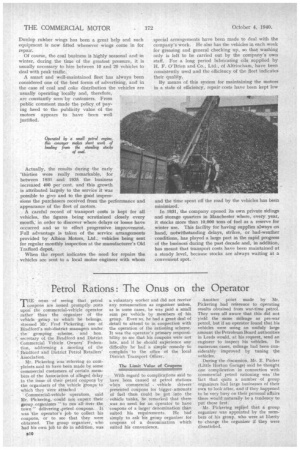Petrol Rations The Onus on the Operator
Page 28

If you've noticed an error in this article please click here to report it so we can fix it.
onus of seeing that petrol 1 coupons are .issued promptly rests upon the commercial-vehicle operator • rather than the 'organizer of the vehicle group to which he belongs, stressed Mr. Fred Pickering, one of . Biadford's sub-district managers under • the grouping • scheme, and hon. . secretary of the Bradford and District Commercial Vehicle Owners' Federation, addressing a meeting of the Bradford and District Petrol Retailers' • Association.
Mr. Pickering was referring to cornplaints said to have been made by some commercial customers of certain members of the Association of alleged delay in the issue of their petrol coupons by the organizers of the vehicle gi'oups to • which they were attached • Commercial-vehicle operators, said Mr. Picketing, could not expect their group organizers "to run all over the town " delivering .petrol coupons. It was the operator's job to collect his coupons, or to see that they were obtained. The group organizer, who had his own job to do in addition, was a voluntary worker and did not receive any remuneration as organizer unless, as in some cases, he was paid a small sum per vehicle by members of his group. Even so, be had a great deal of detail to attend to in connection with the operation of the rationing scheme. It was the operator's primary responsibility to see that his coupons were not late, and if he should experience any difficulty he had a simple remedy to complain •to the office of the local District Transport Officer.
The Limit Value of Coupons With regard to complications said to have been caused at petrol stations when commercial vehicle drivers presented coupons for bigger. amounts of fuel than could be got into the vehicle tanks, he remarked that there was no need for an operator to have 'coupons of a larger denomination than suited his requirements. He had simply to ask his group organizer for coupons of a denomination which suited his convenience.
Another point made by Mr. Pickering had reference to operating results obtained from war-time petrol. They were all aware that this did not yield the same Mileage as pre-war petrol, but if an operator found that his vehicles were using an unduly large amount the Petroleum Board authorities in Leeds would, at his request, send an engineer to inspect his vehicles. In nunierous cases, mileage had been considerably improved by tuning the vehicles.
During the discussion, Mr, E. Parker (Little Horton Garage) said he thought one complication in connection with commercial petrol rationing was the fact that quite a number of group organizers had large businesses of their own t6 look after, and U they happened to be very, busy on their personal affairs there would naturally be a tendency to
put those first. .
Mr. Pickering replied that a group organizer was appointed by the members of his group, who were at liberty to change the organizer if they were dissatisfied.




















































